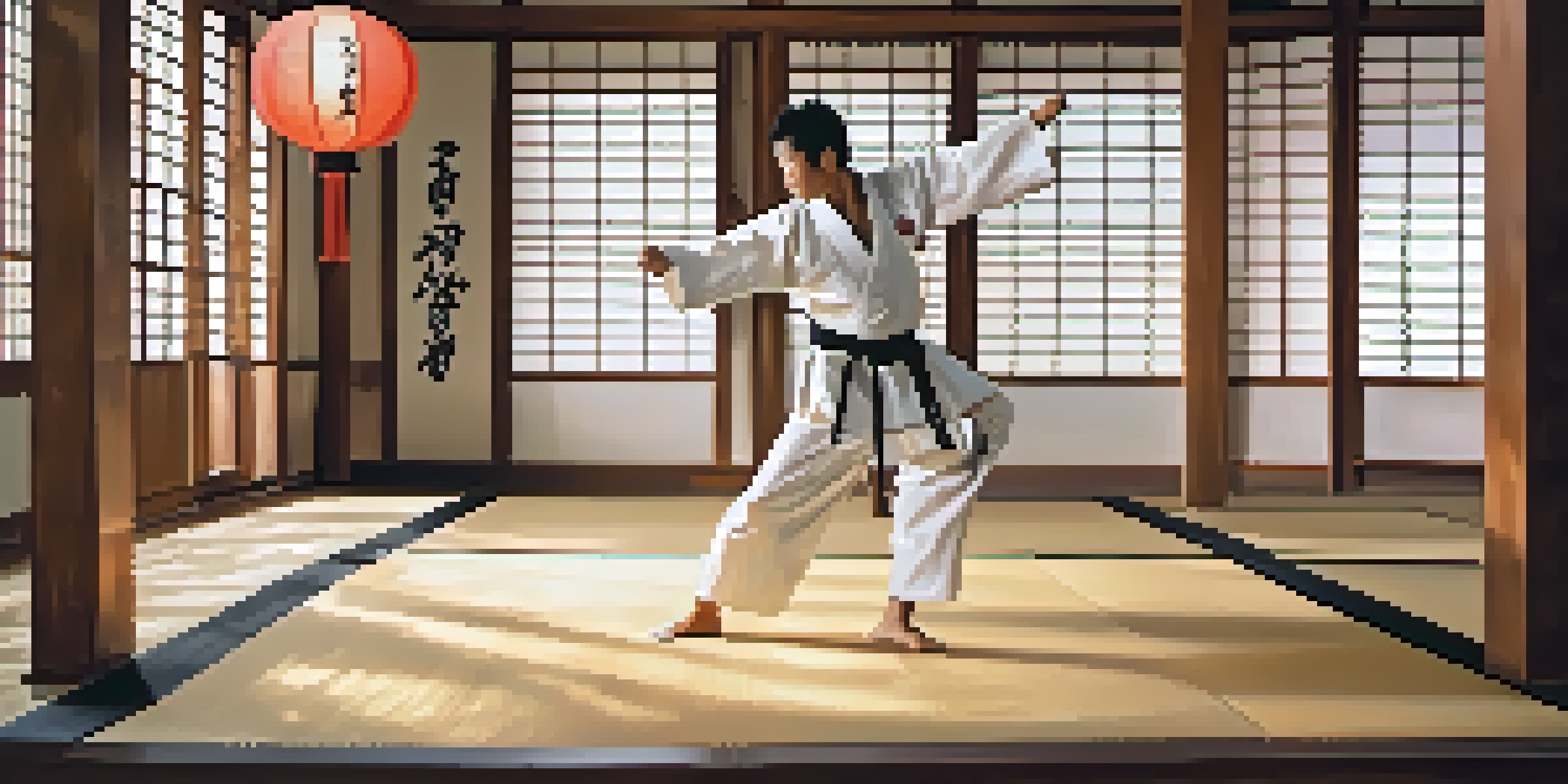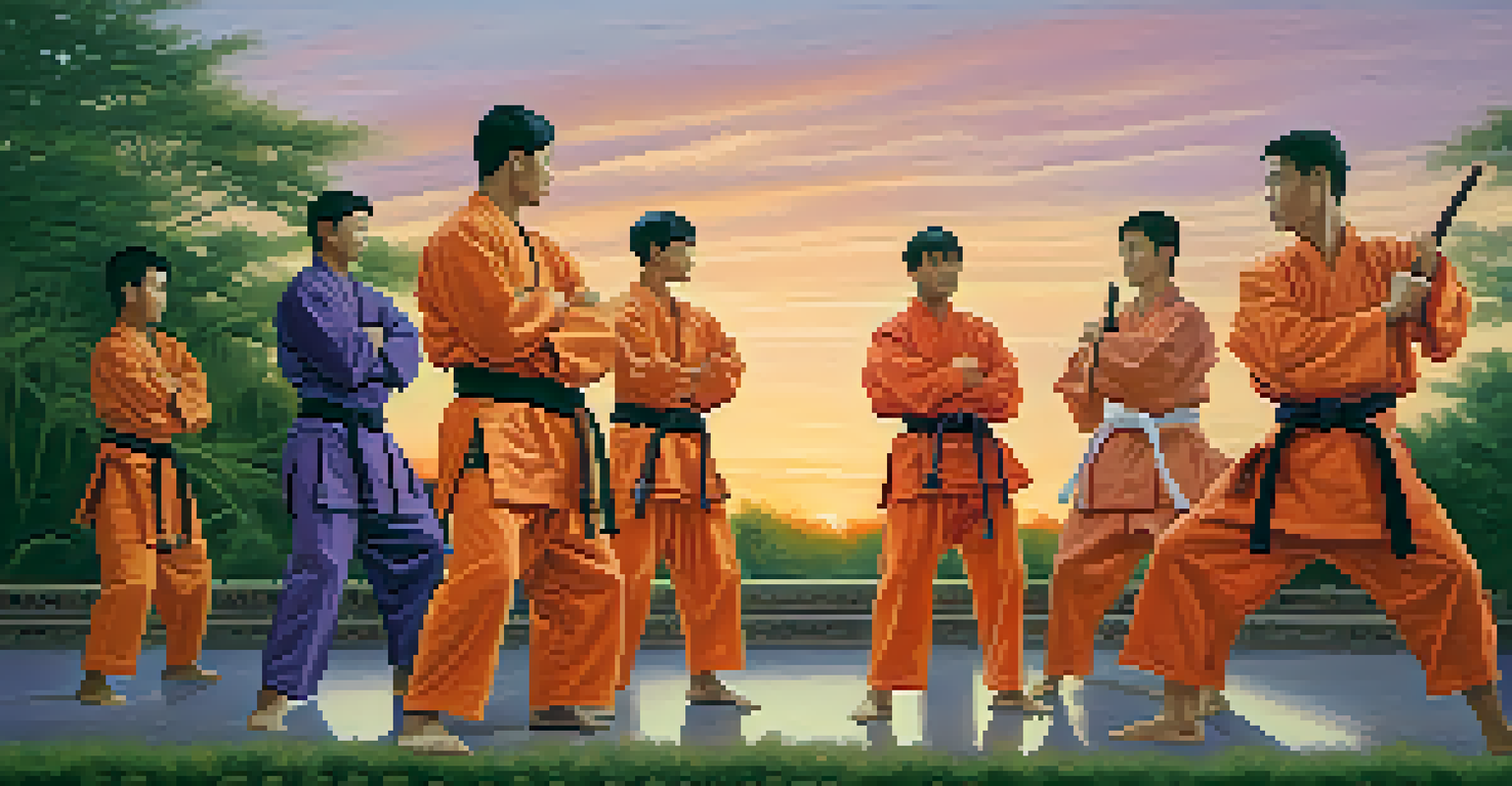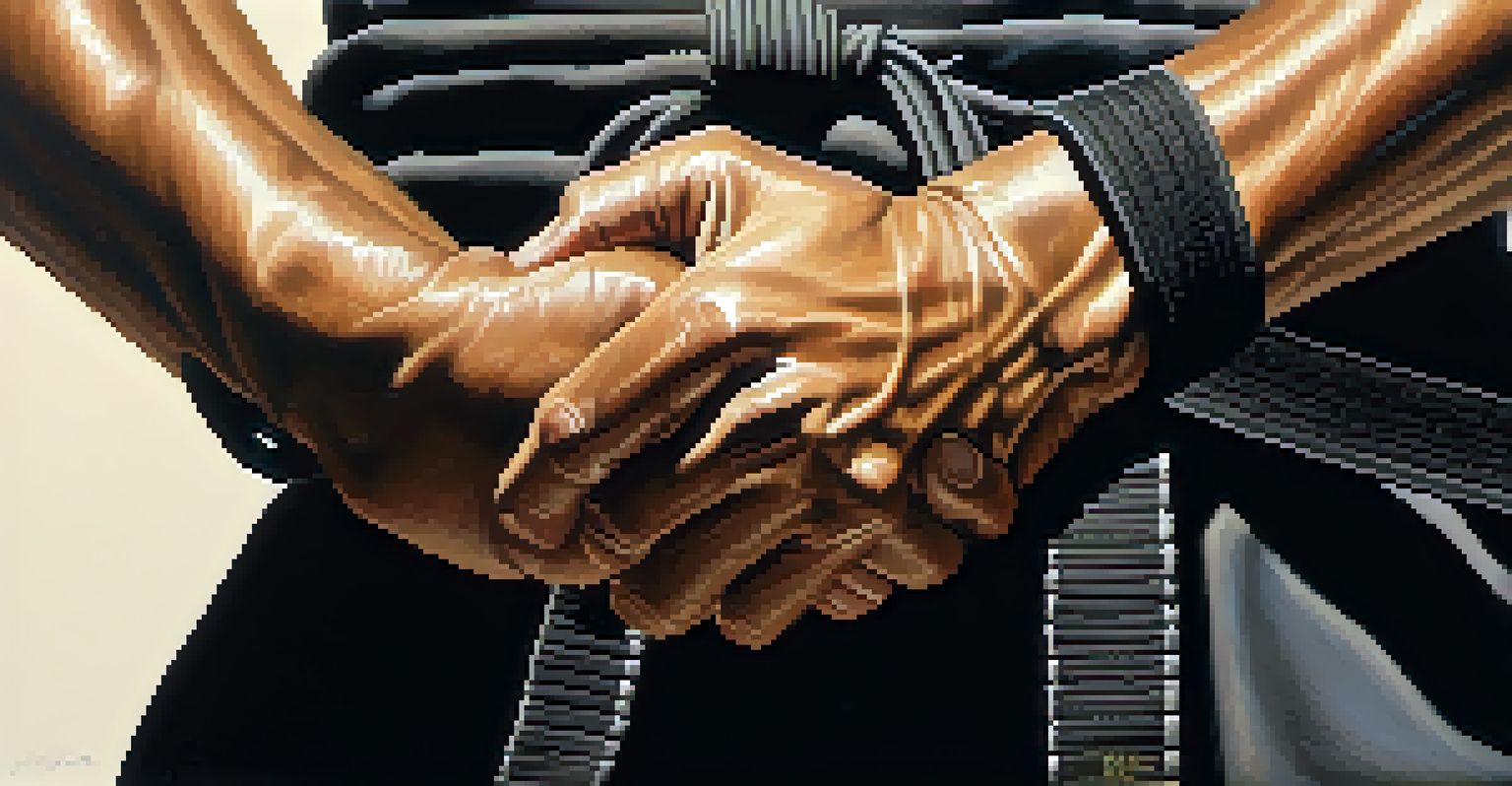The Connection Between Martial Arts and Mental Toughness

Understanding Mental Toughness in Martial Arts
Mental toughness is often defined as the ability to push through adversity and maintain focus under pressure. In martial arts, this trait is essential, as practitioners frequently face physical and psychological challenges, whether during training or competition. The discipline demanded in martial arts cultivates this resilience, enabling individuals to confront fears and setbacks head-on.
Mental toughness is essential for success in any endeavor, as it empowers individuals to overcome obstacles and stay committed to their goals.
Martial artists learn to embrace discomfort, whether it's through rigorous training sessions or sparring with opponents. This embrace of hardship fosters a mindset that views challenges as opportunities for growth rather than obstacles to success. Over time, these experiences build a robust mental framework that allows practitioners to tackle not just martial arts but various life challenges with confidence.
The connection between martial arts and mental toughness is profound; each punch, kick, and block is a step toward developing a more resilient self. As martial artists train, they not only enhance their physical abilities but also strengthen their mental fortitude, preparing them for whatever life throws their way.
Discipline: The Backbone of Martial Arts Training
Discipline is a core component of martial arts, demanding consistency and commitment from practitioners. This consistent practice instills a sense of responsibility and accountability, traits that are fundamental in nurturing mental toughness. Just like honing a skill, the repetition of movements and techniques requires focus and perseverance.

As martial artists adhere to rigorous training schedules, they learn to prioritize their goals, often finding themselves saying 'no' to distractions that could derail their progress. This cultivated discipline not only enhances their martial arts skills but also translates into other areas of life, such as academics and career pursuits. Ultimately, discipline creates a strong foundation for mental resilience.
Mental Toughness in Martial Arts
Martial arts training fosters mental toughness by encouraging practitioners to face challenges, embrace discomfort, and build resilience.
Through the lens of martial arts, discipline becomes a powerful tool for building mental toughness. Each time a practitioner pushes through fatigue or disinterest, they reinforce their ability to stay committed, showcasing that mental strength is as much about willpower as it is about physical ability.
Overcoming Fear: A Key Element of Mental Fortitude
Fear is a natural response, especially in high-stakes environments like a martial arts dojo. Practitioners often face their fears head-on, whether it's the fear of failure, injury, or sparring with a more experienced opponent. This confrontation teaches them that fear can be managed and even used as a motivator, rather than a barrier.
The journey of a thousand miles begins with one step.
The process of overcoming fear is not instantaneous; it requires practice and patience. Every time a martial artist steps onto the mat, they are given an opportunity to challenge their fears, gradually building confidence and mental resilience. Each success, no matter how small, reinforces the belief that they are capable of handling difficult situations.
By learning to navigate their fears, martial artists cultivate a mindset that embraces challenges. This proactive approach not only enhances their performance in martial arts but also equips them with the tools to tackle fears in various aspects of life, from public speaking to pursuing new opportunities.
The Role of Mindfulness in Martial Arts Practice
Mindfulness plays a significant role in martial arts, encouraging practitioners to be present and aware during training. This focus on the moment helps to eliminate distractions, allowing individuals to engage fully with their practice. By honing their concentration, martial artists improve their performance while simultaneously strengthening their mental resilience.
Incorporating mindfulness techniques, such as controlled breathing and visualization, can enhance a martial artist's ability to manage stress and anxiety. These techniques encourage a calm mindset, which is crucial during competitions or high-pressure situations. As practitioners learn to remain grounded, they develop a heightened sense of control over their mental state.
Discipline Fuels Success
The consistent practice required in martial arts instills discipline, which enhances focus and perseverance both in and out of the dojo.
Ultimately, mindfulness is a powerful ally in cultivating mental toughness. By fostering a deeper connection to their mind and body, martial artists can approach challenges with clarity and confidence, transforming potential stressors into opportunities for growth.
Building Confidence Through Skill Mastery
As martial artists progress through their training, they experience a sense of accomplishment that boosts their confidence. Mastering new techniques and achieving belt promotions are tangible indicators of their growth. This sense of achievement fosters a belief in their abilities, which is vital to developing mental toughness.
Confidence gained from skill mastery extends beyond the dojo. Martial artists often find themselves more self-assured in social situations, academics, and their careers. This newfound confidence translates to a resilient mindset that allows them to tackle challenges with a belief in their capabilities.
The repetitive practice of techniques not only builds physical skills but also reinforces a positive self-image. As martial artists recognize their improvements, they cultivate a strength that empowers them to face adversity in all areas of life, further enhancing their mental toughness.
Community Support: A Pillar of Strength
The martial arts community provides invaluable support, fostering a sense of belonging among practitioners. This communal environment encourages individuals to share their experiences, challenges, and victories, creating a network of encouragement. Such support can significantly bolster mental toughness, as practitioners learn they are not alone in their struggles.
Training alongside peers helps martial artists develop camaraderie, which can be a powerful motivator. They push each other to improve, share techniques, and celebrate achievements together, reinforcing their resilience. This collective spirit not only enhances individual training but also strengthens the community as a whole.
Community Enhances Resilience
The supportive environment of the martial arts community provides encouragement and camaraderie, helping practitioners strengthen their mental toughness.
Ultimately, the bonds formed in martial arts classes contribute to a supportive atmosphere that nurtures mental toughness. Knowing that they have a network cheering them on empowers practitioners to confront their fears and challenges with confidence, making their journey even more rewarding.
The Lifelong Benefits of Martial Arts Training
Engaging in martial arts is not just about physical prowess; it's a holistic practice that promotes mental and emotional well-being. The skills developed through martial arts training, such as discipline, focus, and resilience, benefit practitioners long after they leave the dojo. These lessons become essential tools for navigating life's ups and downs.
As martial artists continue their journey, they often find themselves better equipped to handle stress and adversity. The mental toughness cultivated through years of training translates to enhanced problem-solving skills and emotional regulation. This ability to remain calm and focused in challenging situations is a valuable asset in both personal and professional realms.

Ultimately, the lifelong benefits of martial arts extend far beyond the mat. By instilling a sense of discipline, resilience, and community, martial arts practitioners carry these lessons into every aspect of their lives, becoming more mentally tough individuals.